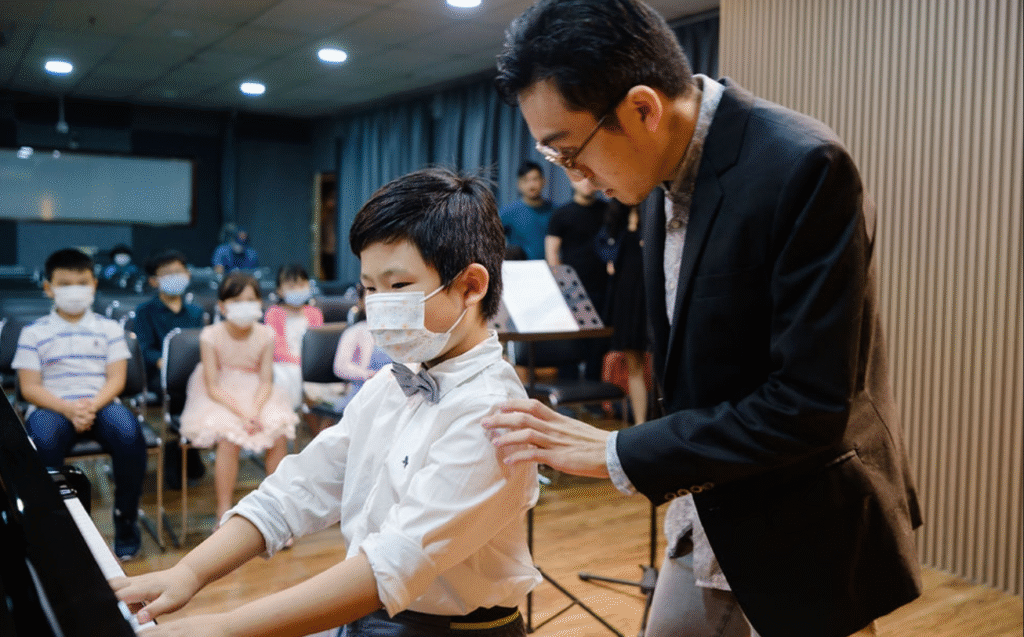Image Source: alphapianostudio.com
Music has the ability to motivate, make us feel better, and enhance quality of life. Of the many musical instruments, the piano is probably the most flexible and expressive instrument and the best choice with which to lay the foundations of musical learning. Piano lessons singapore have grown in popularity in Singapore, where arts and education are well regarded, with children, teenagers and adults all signing up to learn.
There’s more to taking piano lessons than learning how to play an instrument. They develop discipline, patience, creativity and confidence. Whether aspiring to a professional career in music or just wishing to enjoy a rewarding pastime, students of all ages and standards can find routes for fulfilling their ambitions through the rigour of piano teaching in Singapore.
The Importance of Piano Education
Learning to play the piano trains your brain cognitively and emotionally. Research suggests that piano playing improves memory, attention, and coordination. Early childhood exposure to piano lessons can help children do better in school and develop a lasting love of music. Adults tend to view learning piano more as a satisfying hobby that helps them de-stress and be creative, but also keeps the brain engaged in old age.
Professional piano lessons also cover music theory, sight-reading and improvising. These components a learner to gain an expertise of music and play pieces with feelings and accuracy technically.
Why Choose Piano Lessons in Singapore
A Singapore has a multicultural, comprehensive and well-organized system for music education including trained teachers, established music schools and adequate facilities for music teaching. Learners have the flexibility to select a suitable approach towards learning based on their schedules, ability and preferences with the options of private lessons, group classes, and workshops.
Structured Learning Approach
Successful piano lessons have a predictable format that includes some combination of technical exercises, musical interpretation, and performance preparation. Novices work on techniques basics, note reading, and rhythm patterns. As they advance, students study more difficult works, gain facility, and begin to communicate feeling in dynamics and in phrasing.
Intermediate and advanced students study to improve their technique, to branch out into different styles of music and to prepare for recitals or exams. Balanced piano study also includes ear training, sight-reading, and opportunities to improvise, all of which contribute to a musician’s growth.
Benefits for Children and Young Learners
The piano lessons are conducted in a fun and engaging manner for the children and the learning in Singapore is tailored to the individual. Early piano education improves fine motor skills, hand eye coordination, and spatio-temporal reasoning. They are applicable to other areas of study, such as math and problem solving.
Also, learning to play the piano teaches discipline and determination. Practicing regularly means setting goals and managing your time, making you more focused – all of which serve you well in school and in life. Several younger students report blossoming confidence and emotional intelligence as they are performing for family and friends, as well as in music recitals.
Benefits for Adults and Hobbyists
Piano lessons aren’t only for kids; adults can also reap the rewards of guided instruction. For most people, playing the piano is a rewarding pastime where they get to express their creative side and unwind from everyday pressure. Adult students are often more relaxed about the structure of lessons and appreciate being able to move at their own speed.
Also, playing the piano improves brain function and memory, so it is an excellent activity for mental health. Adults can take piano lessons as a form of personal expression, giving them the opportunity to connect with music on an emotional level as well as the sense of accomplishment that comes from mastering songs.
Choosing the Right Piano Instructor
The success of piano lessons depends on how good the teaching is. Good teachers of any subject are not only skilled at teaching that subject technically, but are also inspiring and motivating and this is true for piano teachers as well. In Singapore, piano teachers provide customized lessons plans based on a student’s age, skill level, personal musical interests and ambitions.
A good piano teacher compliments technical training with creative discovery, and welcomes students to play with interpretation and performance style. They offer constructive criticism, track progress, and rejoice accomplishments to foster a positive and encouraging learning atmosphere.
Importance of Practice and Discipline
Regular practice is necessary to become good at playing the piano. Professional piano lessons in Singapore focus on structured practice schedules that help students maximize their progress and keep their skills.
Practice strengthens not only the technical skills, but also a more profound relationship with music. As students advance, they develop the skill of interpreting musical pieces with feeling and subtleties, enabling them to turn technical exercises into expressive performances.
Performance Opportunities and Examinations
There are piano schools in Singapore that will allow the student to take part in recitals, competitions as well as formal music examinations. These are vital experiences for any burgeoning performer to develop self-confidence, stage presence, and skill in performing.
The Role of Technology in Modern Piano Lessons
Contemporary piano teaching techniques in Singapore usually include the use of technology to facilitate learning. Digital pianos, online lessons and music applications can supplement traditional instruction and allow students to practice more efficiently and monitor their progress. Virtual lessons also offer convenience for students who have busy schedules or who live too far from schools to attend classes in person.
With technology, piano teaching is more accessible and fun and can be tailored to suit different types of learners, which in turn, makes achieving musical goals better for students.
Long-Term Benefits of Learning Piano
There are many advantages to learning piano and they go a lot further than just being able to play an instrument. It encourages creativity, emotional release, discipline, and mental stimulation. Students frequently transfer the skills and lessons they have learned in other areas of life including better focus, enhanced problem-solving, and increased well-being.
Piano lessons are a rewarding experience for the family, the child and the grown-up, combining teaching, artistry and personal development. The benefits of learning Piano also extend way beyond you music life, as the skills that you gain through Piano tuition really do provide solid grounding for music enjoyment and appreciation for life.
Conclusion
The piano learning are in great demand in Singapore as it is an incredible swift to one’s musical ability and cognitive and emotional skills, not to mention the pleasure of making melodies. Structured piano education gives children, teens and adults a route for success in meeting their own goals, performing with confidence, and developing a lifelong love of music.






